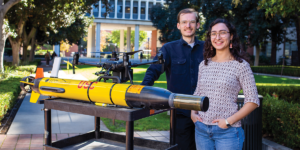
Photo Credit: imaginima/iStock
Quantum computers have always been touted as “magical” devices in science-fiction movies – however, their impact may soon become a reality.
ISI’s Itay Hen, Research Team Leader at the Hen Lab, is leading a multi-institutional effort funded by the US Department of Defense (specifically DARPA) to figure out how to test the capabilities of quantum computers.
Together with fellow ISI researcher Amir Kalev, USC Dornsife professor Rosa Di Felice and others, Hen is investigating the opportunities presented by quantum technologies.
“Quantum computers promise many more things than standard computers,” explained Hen. “DARPA wanted to know whether to invest in building large-scale quantum computers, and what society could gain from them.”
The research team doesn’t just identify problems that quantum computers could help with, but they also quantify clear benchmarks for testing and determine the required resources.
“We need to ensure we stay on track and develop our efforts where quantum is useful,” Kalev added.
Merging science with application
Hen gathered multi-disciplinary teams to ensure their contributions were impactful. Subject matter experts devised applicable questions, while quantum computing scientists distilled their computational aspects.
Di Felice is one of these subject matter experts. She noted, “I identify theories and resources needed to solve the problems we’re interested in, and explain why it’s more suitable for quantum as opposed to classical computing methods.”
At times, communication was a challenge.
“At first, it felt like we were speaking different languages. We quantum information scientists had to explain our thoughts in more grounded language, and not describe things in terms of abstract, algorithmic values,” Hen recalled.
Questions for quantum
“Quantum computers could help discover new materials with esoteric properties,” said Hen. “They can also solve complicated differential equations, predicting how complex systems, such as the stock market, operate and behave.”
One of their proposed questions is whether quantum computers could help find new superconductors.
A superconductor is a high-efficiency material that runs electrical currents without resistance. Normal electrical currents generate a lot of heat and wasted energy, while superconductors can run currents without generating heat.
As superconductors usually work at low temperatures, the researchers wondered if quantum computers can find some that work at room temperatures, which could become a core component of technological advances.
“For example, it’s impossible to run a train on superconducting material because things would have to be very cold,” remarked Kalev. “With room-temperature superconductors, this would be feasible.”
Solving the yet unsolvable
So far, the research teams have discovered intriguing techniques to devise problems that no existing computer can solve. If quantum computers prove to be effective at solving these problems, they might transform society for the better.
“We needed to formulate questions that we know the answer to, but are impossible for standard computers to solve,” said Hen.
Hen and the others are also planning for a future where quantum’s impact continues to grow and spread.
Di Felice noted, “Our research motivates other scientists to work harder to create quantum chips. Quantum computing could tap into more industries like health and energy production.”
Published on March 12th, 2024
Last updated on May 16th, 2024












